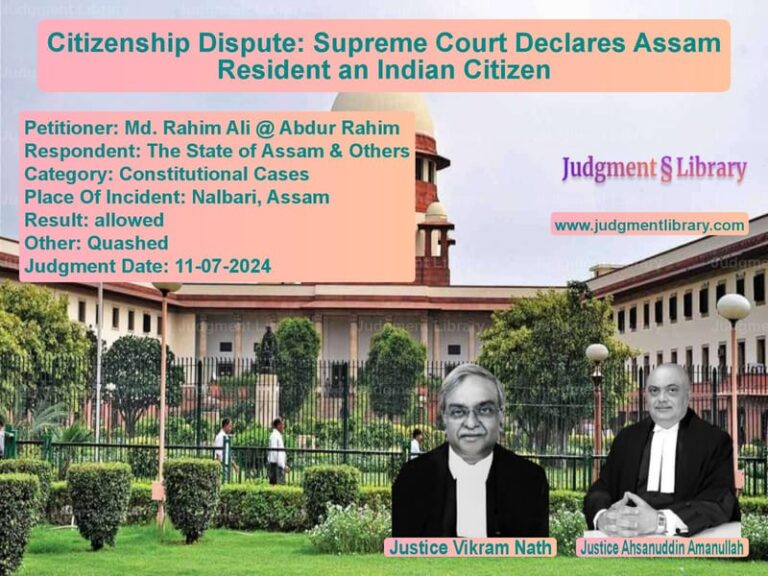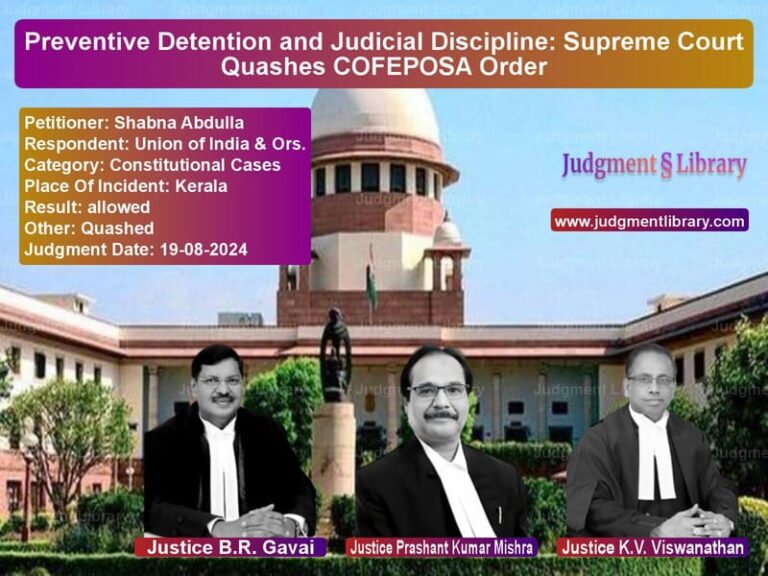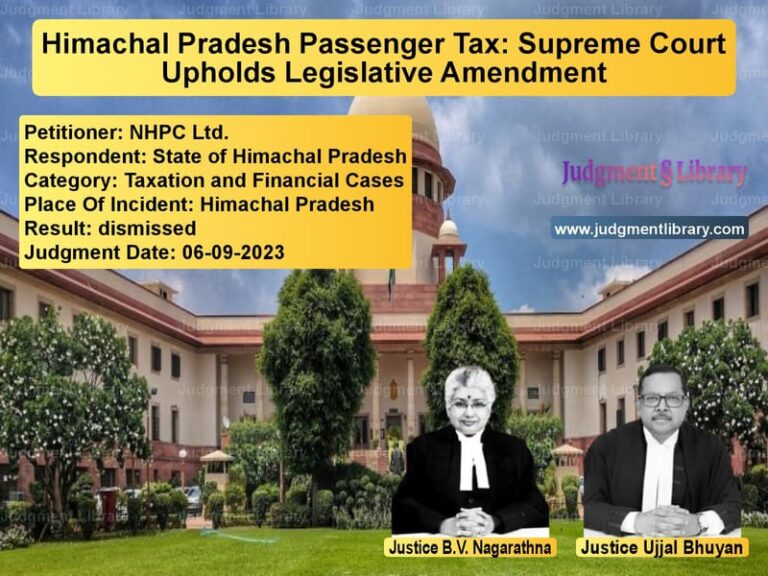Government of NCT of Delhi vs. Krishna Saini & Others: Supreme Court Overrules Land Acquisition Lapse
The Supreme Court of India, in its judgment dated December 2, 2022, in the case of Government of NCT of Delhi vs. Krishna Saini & Others, overturned the Delhi High Court’s ruling that had declared land acquisition proceedings lapsed under Section 24(2) of the Right to Fair Compensation and Transparency in Land Acquisition, Rehabilitation, and Resettlement Act, 2013. This case involved a long-standing dispute regarding land acquired under the Land Acquisition Act, 1894.
The Supreme Court, relying on its Constitution Bench judgment in Indore Development Authority vs. Manoharlal, held that non-payment of compensation alone does not lead to the lapse of land acquisition proceedings. The ruling clarifies the interpretation of Section 24(2) of the 2013 Act and has significant implications for landowners and government authorities handling land acquisition cases.
Background of the Case
The dispute arose over land acquisition proceedings initiated by the Government of NCT of Delhi. The acquisition process was conducted under the Land Acquisition Act, 1894, which was later replaced by the 2013 Act. The Delhi High Court had declared the acquisition as lapsed under Section 24(2) of the 2013 Act, relying on the Supreme Court’s earlier judgment in Pune Municipal Corporation vs. Harakchand Misirimal Solanki.
The Government of NCT of Delhi challenged this decision, arguing that compensation had been deposited in court and that possession had been taken, fulfilling the requirements under the law. The case reached the Supreme Court, which was tasked with determining whether the land acquisition proceedings had indeed lapsed.
Arguments Presented
Petitioners’ (Government of NCT of Delhi) Arguments
The Government of NCT of Delhi, represented by its counsel, argued:
- The Delhi High Court’s ruling was incorrect, as it relied on a judgment that was later overruled by the Supreme Court’s Constitution Bench in Indore Development Authority.
- Possession of the land had already been taken on September 5, 2002.
- The Supreme Court had clarified that compensation deposited in court satisfies the legal requirement for payment under Section 24(2) of the 2013 Act.
- The High Court failed to consider the fact that the delay in disbursing compensation was due to pending litigation and administrative procedures, not due to inaction on the part of the government.
Respondents’ (Landowners) Arguments
The respondents, represented by their counsel, countered with the following points:
- The landowners had not received compensation, and mere deposit in court does not amount to actual payment.
- The Delhi High Court had correctly followed its earlier ruling in Gyanender Singh vs. Union of India, where it was held that unless compensation is tendered to landowners, acquisition should be considered lapsed.
- The possession of land was disputed, and the government had not provided clear evidence that it had actually taken possession.
Supreme Court’s Observations
The Supreme Court carefully examined the legal and factual aspects of the case and observed:
- “The decision of this Court in the case of Pune Municipal Corporation (2014) has been specifically overruled by the Constitution Bench of this Court in Indore Development Authority.”
- “Under the provisions of Section 24(2) of the 2013 Act, the lapse of land acquisition proceedings occurs only when both conditions—failure to take possession and failure to pay compensation—are met.”
- “The word ‘or’ in Section 24(2) has to be read as ‘nor’ or as ‘and,’ meaning that if either possession has been taken or compensation has been paid, the acquisition does not lapse.”
- “In this case, since possession had been taken and compensation had been deposited in court, the acquisition could not be considered lapsed.”
Legal Interpretation of Section 24(2) of the 2013 Act
The Supreme Court, in Indore Development Authority, provided clarity on how Section 24(2) should be interpreted:
- The lapse of land acquisition proceedings requires both non-payment of compensation and failure to take possession.
- Depositing compensation in court is sufficient compliance with the legal requirement of payment.
- Landowners who refuse to accept compensation or seek higher compensation through legal proceedings cannot claim that acquisition has lapsed.
- Once possession is taken, land vests in the state, and acquisition cannot be reversed under Section 24(2).
Judgment and Ruling
The Supreme Court ruled in favor of the Government of NCT of Delhi and held:
- The Delhi High Court’s judgment was quashed and set aside.
- The land acquisition proceedings were upheld as valid and not deemed to have lapsed.
- The ruling in Indore Development Authority was reaffirmed as the authoritative interpretation of Section 24(2) of the 2013 Act.
Implications of the Judgment
This ruling has wide-ranging implications for land acquisition cases in India:
- Government authorities can now rely on the clarity provided by the Supreme Court regarding Section 24(2) of the 2013 Act.
- Landowners cannot claim lapse of acquisition proceedings solely based on non-payment of compensation if it has been deposited in court.
- Public infrastructure projects that were stalled due to legal challenges may now proceed without unnecessary delays.
Conclusion
The Supreme Court’s decision in Government of NCT of Delhi vs. Krishna Saini & Others is a landmark ruling that reinforces the legal position on land acquisition proceedings. By upholding the acquisition and quashing the Delhi High Court’s ruling, the Court has ensured that landowners do not unfairly benefit from procedural delays and that public projects can continue without legal hurdles. This judgment sets a crucial precedent for future land acquisition cases and provides clarity on the application of Section 24(2) of the 2013 Act.
Petitioner Name: Government of NCT of Delhi.Respondent Name: Krishna Saini & Others.Judgment By: Justice M.R. Shah, Justice C.T. Ravikumar.Place Of Incident: Delhi.Judgment Date: 02-12-2022.
Don’t miss out on the full details! Download the complete judgment in PDF format below and gain valuable insights instantly!
Download Judgment: government-of-nct-of-vs-krishna-saini-&-othe-supreme-court-of-india-judgment-dated-02-12-2022.pdf
Directly Download Judgment: Directly download this Judgment
See all petitions in Property Disputes
See all petitions in Landlord-Tenant Disputes
See all petitions in Specific Performance
See all petitions in Judgment by Mukeshkumar Rasikbhai Shah
See all petitions in Judgment by C.T. Ravikumar
See all petitions in allowed
See all petitions in Quashed
See all petitions in supreme court of India judgments December 2022
See all petitions in 2022 judgments
See all posts in Civil Cases Category
See all allowed petitions in Civil Cases Category
See all Dismissed petitions in Civil Cases Category
See all partially allowed petitions in Civil Cases Category







